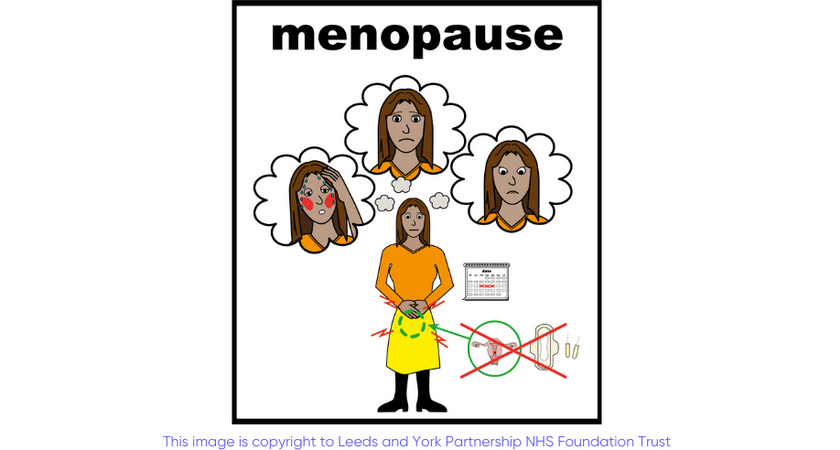Supporting Women with Learning Disabilities Through the Menopause
Menopause and people with learning disabilities

The menopause is a process that happens to women and people with ovaries which marks the end of menstrual cycles and fertility.
The average age for menopause among the mainstream population is 51. Menopause itself is one day. Peri menopause is the part before menopause, which can start years before the day of menopause. Post menopause is the time 12 months after the last menstrual period. On average peri, menopause and post menopause take seven years to complete. There are 13 million menopausal people in the UK. (NHS 2022)
Black and Latina people reach menopause at age 49, two years earlier than white women and their symptoms last an average of 10 years. (Thomas et al 2001, Gold 2011).
During peri, menopause and post menopause, the body undergoes hormonal changes and a significant decrease in oestrogen, which leads to a variety of symptoms.
Common symptoms include:
- Hot flushes (called hot flashes in the US): A sudden feeling of warmth or heat within the body that can make the person feel flushed or sweaty.
- Night sweats: Hot flushes that occur during sleep, sometimes waking the person up.
- Mood changes: Feeling more anxious, irritable, or low.
- Sleep problems: Difficulty falling or staying asleep.
- Memory problems or "brain fog": Trouble focusing or thinking clearly.
- Physical symptoms: Changes in skin, hair, or vaginal dryness and skin itchiness.
Some people with particular types of genetic disability, such as Down’s Syndrome, or Williams Syndrome experience an earlier menopause than the general population, at an average age of 44. People with Fragile X and Turner Syndrome may experience Primary Ovarian Insufficiency (POI), a lack of oestrogen, leading to early menopause, around the age of 40. This means that for some people with learning disabilities, peri menopause could begin in their thirties and can be overlooked or mistaken for something else.
Menstrual changes (which can be a first indicator of menopause) may be masked by long term use of a hormonal form of contraception, such as the pill, an IUS, the implant or Depo-Provera injection, and people with learning disabilities do not always have their contraception reviewed regularly enough. (Earle et al 2015).
For people with learning disabilities, understanding and managing menopause can present unique challenges. Some people may have difficulty identifying, describing, or managing the physical and emotional changes associated with menopause, making it important to offer tailored support and guidance.
Some things to consider about menopause and people with learning disabilities:
- Diagnostic overshadowing: This is where a symptom that someone with a learning disability has, is attributed to their disability rather than considering other factors, such as the menopause.
- Early on set dementia: More people with learning disabilities experience early onset dementia than the mainstream population, so memory problems and brain fog may be attributed to this rather than the menopause.
- Understanding symptoms in your body: It may be more difficult for people with learning disabilities to understand what is happening in their body during menopause.
- Expressing feelings: People with learning disabilities might have difficulty expressing feelings like anger or frustration or how they are experiencing pain. They may exhibit behaviour changes, which can be more difficult to interpret for the people around them.
- Support: The people around the person with a learning disability may know very little about the menopause so may not be able to identify the symptoms or know how to support the individual.
- Mental health issues: Anxiety and feeling low can be difficult for people with learning disabilities to identify and tell others about.
- Accessing help: People with learning disabilities might need more support than others to access the help available for menopause.
Support staff can talk to people with learning disabilities about life style changes which may help. These can include:
- A healthy diet
- Exercise
- Stress management
- Sleep monitoring
Supporting people at home
When people with learning disabilities live at home, their families may also need help and support to understand the symptoms and treatment available.
Hormone Replacement Therapy (HRT), is also available. This treatment can help balance hormones and alleviate symptoms like hot flushes, mood changes, and sleep problems. It’s important that this is discussed with a healthcare provider who understands the individual’s needs and medical history.
Some herbal supplements, such as black cohash and red clover (NICE, 2024), primrose oil and starflower oil have all proven, to different extents, to have benefits for menopausal people. Any of these should also be discussed with a healthcare professional to decide on the best treatment for each individual.
People with learning disabilities would need help and support to weigh up the pros and cons of using HRT or other supplements. They may need a longer appointment with their GP to discuss their symptoms, and the GP may want a support worker or family member to provide some information before or during the appointment. Keeping a period log and a symptom log can be really useful. You can use this one from the Leeds and York Partnership NHS Foundation Trust.
Do
- remember that every person will experience their menopause differently
- support and empower someone with a learning disability to make decisions about treatment themselves
- provide easy read information and advice about the menopause. This video on the SeeAbility website is good.
Don't
- assume that symptoms that could be menopausal are related to someone’s learning disability
- expect someone to understand mainstream information about menopause – it’s complicated
- leave someone to go to a GP appointment by themselves, if they want help, and make sure the GP is aware you will need more time.
What is menopause and perimenopause? Easy Read video guide
Case Study
Lisa is a 48-year-old woman with a learning disability, autism, and she uses limited verbal communication. She lives in supported housing with 24-hour support. Over the past year, Lisa’s anxiety increased, she experienced frequent mood swings, and she struggled with disrupted sleep. She also began refusing certain clothes, seeming uncomfortable due to overheating. Initially, staff thought these changes were due to sensory sensitivities and anxiety, but they later considered whether menopause could be a factor.
One. Approach to addressing the issue
- Staff received menopause training and recognised Lisa’s symptoms as potential signs of perimenopause.
- They kept a symptom diary, noting patterns of distress, sleep issues, and possible hot flushes.
Two. Healthcare advocacy and healthcare treatment
- Lisa was supported at a GP appointment, with extra time scheduled to discuss menopause.
- The GP confirmed that menopause was likely contributing to Lisa’s distress and prescribed a low-dose HRT patch to help stabilise hormone levels.
- Staff explained to Lisa, in simple terms, that the patch would help her feel better. They used visuals to support her understanding.
- The team monitored Lisa’s reaction to the treatment, ensuring she was comfortable wearing the patch and that it was applied in a way that fit her sensory needs.
Three. Routine and environmental adjustments
- Lisa’s room was kept cool, and she was encouraged to wear light, breathable clothing to manage overheating.
Four. Diet and lifestyle support
- Staff introduced more calcium-rich foods to support bone health, alongside vitamin D supplements.
- Lisa was encouraged to engage in gentle exercise, such as short walks, to help with mood and energy levels.
Five. Ongoing monitoring and emotional support
- Lisa’s support team continued tracking her symptoms and mood to assess the effectiveness of HRT.
- They reassured Lisa about changes in her body, using simple language and familiar routines to support her understanding.
With HRT, Lisa’s mood stabilised, her sleep improved, and she was less distressed by overheating. The structured support helped her feel more in control, making menopause a more manageable experience for her.
Top Tips
- Don’t dismiss symptoms – Mood changes, sleep issues, and discomfort may be menopause, not just part of a learning disability.
- Ensure you use accessible information – Use easy-read materials, visuals, and sensory-friendly ways to explain menopause.
- Small changes help – Keep rooms cool, offer breathable clothing, and encourage relaxation, exercise, and a healthy diet.
- Educate yourself – Learn about menopause and how it affects people with learning disabilities to provide better support.
Claire Lightley, Bodysense Education.
The views expressed in the Supported Loving toolkit are not necessarily those of Choice Support.





